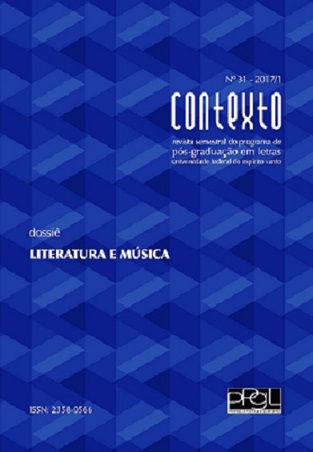Os pingos de Alencar: pervasividade regionalista e reconfigurações fronteiriças de O gaúcho até délibáb
DOI:
https://doi.org/10.47456/contexto.v%25vi%25i.14941Resumo
RESUMO: Este artigo aborda o processo de dispersão da imagem do cavalo na literatura regional sul-rio-grandense a partir do romance O gaúcho (1870), de José de Alencar, até o álbum délibáb (2010), de Vitor Ramil, o qual poemas do escritor argentino Jorge Luis Borges e do poeta gaúcho João da Cunha Vargas. O trabalho aborda, também, a linguagem e a relação estabelecida pelo romance de Alencar com o elemento estrangeiro, ao longo do percurso existente entre as duas obras. Essa evolução é estudada no âmbito dos limites determinados pela obra e seus efeitos no espaço regional que efetivamente alcança ou pretende alcançar, bem como no estabelecimento de fronteiras teóricas entre os conceitos relacionados ao estudo do regionalismo literário.
PALAVRAS-CHAVE: Regionalismo literário. José de Alencar. Vitor Ramil.
ABSTRACT: This article approaches how the dispersion of the horse image works in the regional literature of Rio Grande do Sul, from the novel O Gaúcho, written by José de Alencar, in 1870, to the CD délibáb, from the musician Vitor Ramil, launched in 2010. On this record, poems of the famous argentine writer Jorge Luis Borges and of the unknown rio-grandense poet João da Cunha Vargas put to music. The analysis also covers how the applied language is approached and the connection between the book and the effects in the regional location that effectively achieves it or intends to achieve it. It deals, also, with the setting of the
theoretical boundaries among some concepts related to the literary regionalism study.
KEYWORDS: Literary Regionalism. José de Alencar. Vitor Ramil.
Downloads
Publicado
Edição
Seção
Licença
Copyright (c) 2021 João Claudio Arendt, Marcos Antonio do Amaral de Freitas

Este trabalho está licenciado sob uma licença Creative Commons Attribution-NonCommercial 4.0 International License.

Este obra está licenciado com uma Licença Creative Commons Atribuição-NãoComercial 4.0 Internacional.





